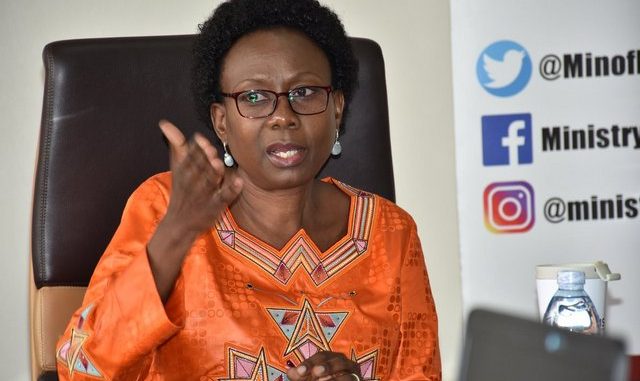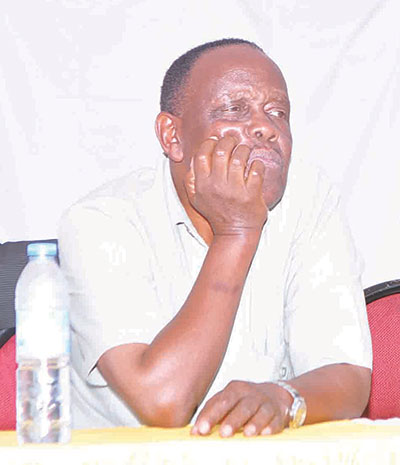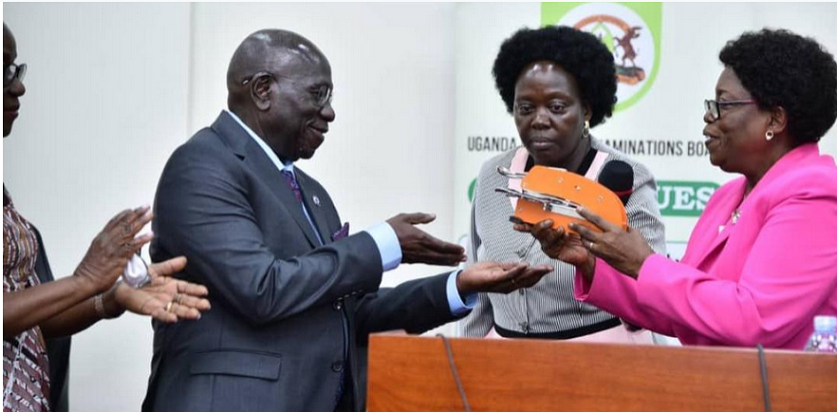Uganda’s Minister for Health, Jane Ruth Aceng (pictured) has revealed that government will start vaccinating children against malaria in 2023 in a bid to reduce malaria related deaths in Uganda.
The Minister made the revelation during the Wednesday plenary sitting in reaction to a motion tabled by Jinja South West MP, Timothy Batuwa, urging Government to strengthen efforts towards the prevention, control and elimination of the transmission of malaria in Uganda.
Minister Aceng informed Parliament that scientists have been studying the malaria vaccine and research has been carried out on the vaccine and Uganda is now ready for implementation and has already received offers from GAVI The Vaccine Alliance
In his motion, Batuwa called on government to increase funding for the fight against malaria pointing out that malaria is responsible for over 30% of the total outpatient visits and there are over 24million cases registered in Uganda in 2020 with 30,900 people having lost their lives to the killer disease.
“Uganda has one of the highest cases of malaria and is ranked fourth in Africa region with over 90% of the population at risk especially children and pregnant mothers with a total of 20.4million cases and a death toll of 30,900 in 2020 alone. Malaria causes an annual economic loss of over US$ 500Million with malaria related expenses,” explained Batuwa.
He urged the Ministry of Health to revise the malaria policy of subsidizing costs of malaria drugs to also cater for the emergency treatment given to patients, saying the other treatment has proved costly to sections of vulnerable Ugandans like pregnant mothers and children below 5years.
“I wish we revise this policy to also subsidise the price for drugs used in emergency care. Malaria is a peculiar disease, when it is severe a patient vomits, and when the patient is vomiting, they need drugs that are taken through other routes and the drugs used that way aren’t subsidised and those ones are still expensive. Could that be the reason why Ugandans and Africans are still dying regardless of the subsidy? So equally important is the need to subsidise drugs used in severe cases,” remarked Batuwa.
Tororo District Woman MP, Sarah Opendi, said that malaria just like road crashes is claiming lives of many Ugandans and called for increased funding to save lives of Ugandans dying from such preventable ailments.
“The challenge is that there is limited funding to deal with malaria in this country and much of the funding is actually from the donors. In order for us to deal with this challenge, we actually need concerted effort but also funding from Government,” Opendi said.
She added: “Let us focus on this killer disease. Malaria and road accidents (crashes) are claiming lives of Ugandans, just over the Easter period, we lost about 59 people, just over three days, you can imagine.”
Pingire County MP, Fred Opolot, called for enactment of the Malaria Control Bill that will enforce the Presidential pledge to provide funding for the fight against malaria to a tune of Shs330Bn as pledged in 2018.
“Given that donor funding has greatly declined, indeed 90% of malaria financing comes from donors, there is an urgent need for Parliament to fast track the Malaria Bill with a chapter establishing a fund whose main objective will be to secure predictable and sustainable means of procuring goods and services for malaria prevention, testing and treatment,” he said.
Speaker Among lashed out at public servants who are fond of diverting funds and items meant for the prevention and treatment of malaria for their personal gains, saying this is demoralizing government.
“People tend to forget about malaria and think about other sicknesses and yet malaria is real. We need to have the preventive programs about malaria because people tend to forget that the disease still exists,” the Speaker said, adding: “. In most cases you find that even when Government tries its best to get the drugs and mosquito nets, they end up in wrong hands, some people end up taking them and doing other things using it for fishing and selling it to other areas.”
Minister Aceng in response said that currently, the budget for malaria is heavily donor funded by GAVI and United States Agency for International Development (USAID) with government allocating only Shs13Bn for malaria drugs.
“The budget for malaria is heavily donor supported. We spend approximately US$120 million on malaria annually and it is majorly donor supported. Through Government of Uganda, we get about Shs13Bn, Shs10Bn of which is for medicines, Shs2Bn for lavicide and Shs1Bn for various interventions,” Aceng said, adding: “There are many interventions that are being carried out, unfortunately, many of them can’t be carried out to scale and one of them is the indoor residual spraying which is extremely expensive, it has to be done every year, you can’t stop it.”
World Malaria Day 2022 will be marked on 25th April 2022 under the theme “Harness innovation to reduce the malaria disease burden and save lives.” No single tool that is available today will solve the problem of malaria.
This year’s celebrations, the world Health Organisation (WHO) is calling for investments and innovation that bring new vector control approaches, diagnostics, anti malarial medicines and other tools to speed the pace of progress against malaria.
The global health body argues that despite steady advances in lowering the global burden of malaria between 2000 and 2015, progress has slowed or stalled in recent years, particularly in high burden countries in sub-Saharan Africa.





